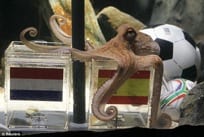Never before has an eight-legged creature been so trusted.
An octopus called ‘Paul’ has captured international attention after correctly predicting the outcomes of all six German World Cup matches.
And now, the mollusk is saying that Spain will defeat Holland in the World Cup final on Sunday.
The octopus, residing in a German aquarium, made his prediction by choosing to eat a mussel from a box emblazoned with the Spanish flag, instead of one with the Holland flag.
Paul even predicted the massive upset when Germany lost to Serbia in the group stages.
According to mathematicians, the odds of anyone correctly guessing six consecutive wins are 216 to 1.
Germans who felt betrayed by Paul’s accurate prediction of their loss to Spain will be happy to know that the octopus has chosen Germany to beat Uruguay in the third place playoff Saturday.
If Paul is correct this Sunday, perhaps grateful Spanish restaurants will have to remove grilled octopus from their menus.







Well, if’s Paul’s wrong then pulpo will be a popular choice in the bars.
And if he’s right, what are we going to eat? I lurve pulpo.
As we approach the 2010 Football World Cup Final between Spain and the Netherlands on Sunday, I wonder how many people are aware that 450-odd years ago the Low Countries (Belgium, the Netherlands and Luxembourg) were part of the Spanish Empire.
Yes, when Charles V of Spain abdicated in October 1555, and control of the Hapsburg Empire was divided, Charles’ son Philip II became ruler of the Netherlands and Spain.
However, Philip II was wholly Spanish in his sympathies and left the Netherlands in 1559, ignoring the opinions of the local magnates. Local discontent in Holland was complicated by the spread of Protestantism – particularly in the cities. In August 1566, Protestants in Ghent, Antwerp and other large cities rose in rebellion and began rioting and smashing images.
Philip responded in 1567, sending a large force of Italian and Spanish soldiers to the Netherlands. Their commander, the Duke of Alba, ruthlessly suppressed all opposition, and levied large taxes to pay for his army. This provoked further resistance amongst both Catholics and Protestants.
During the 1570s, Elizabeth I of England, wary of the Spanish on her doorstep, so to speak, lent small sums of money to the rebels and allowed English volunteers to go to their aid, but she was reluctant to commit troops and provoke an open breach with Spain.
In 1575, the Spanish government went bankrupt, and its unpaid troops went on a rampage. This temporarily united every important interest in the Netherlands against Spain. But when Calvinist enthusiasts in Ghent and other large cities began trying to impose their beliefs on the Catholic population, the Netherlands split in two.
In 1579, the southern provinces, corresponding roughly with present-day Belgium and Luxembourg, formed the Union of Arras, and made peace with Spain. The northern provinces, led by William of Orange, formed the Union of Utrecht, and repudiated Philip’s rule (1581).
Spain made a renewed effort to re-conquer the whole area. Philip’s new commander, Alexander Farnese, had such success that in 1584 Elizabeth I finally decided that she must commit troops to prevent Dutch collapse. In December, Robert Dudley, Earl of Leicester arrived with a force of about 7,000 men, although, badly-led, Leicester’s army achieved very little militarily at very considerable expense.
After continuous fighting and skirmishes involving the Spanish, the French, the English and the Irish over the following years, Spain was finally forced to acknowledge Dutch independence in 1609, thus ending a period of Spanish rule lasting some 54 years.
So, for Sunday’s final, there’s more than a bit of potential niggle. The downtrodden Dutch up against their former rulers, the Spanish. Or is nobody really aware of this historical fact?
Does A1 Solutions do history lessons as well now Paul? lol
Yep, Fred. I realise you will have known all this, but maybe not everyone else did. :)
Thank you Paul.W that was an interesting read
“In 1575, the Spanish government went bankrupt”
Nothing new then.
If you look at a 1000 year scope every European nation has had its issues with another. Bringing up history in football events in this fashion doesn’t favours the fairplay contributing to increase animosity unnecesarily.
Nobody in Holland, except a bunch of fanatics, is sour about the tercios of the Duke of Alba.
Back to Paul, I think Marchena got it right when asked about it: “Well, it’s an octopus”. That’s the virtue of this team, if it get’s the championship it will owe great part of its success to their high standard of professionalism.
Finally, I have bad news for you lovely british expats, Spain has not gone and won’t go into default.
Spain has not gone into default because the mugs in northern Europe and Scandinavia have covered your arse,otherwise Spain like Greece would have gone long ago.
You have received €billions in subsidies and hand outs ever since you entered the EEC, which have mostly been grafted away.
Don’t you understand Carlos, most of the foreigners who come to Spain know quite a lot about finance and the workings of the EEC. Your comments would get support from your fellow countrymen because most have zero knowledge (and don’t want to know) about how their country ticks.
Come July 23rd and the banks ‘stress testing’ everyone engaged in finance worldwide expects the Spanish government to lie about the caxas and their combined bad debts of €445 billion.
However you are right that football should not be coloured by history but totally wrong to talk about Dutch memories of atrocities carried out in the name of God and Spain as remembered by a few fanatics. As someone who has lived in the Netherlands I well remember the bitterness expressed by so many Dutch at what the Spanish did in the Netherlands.
What is this EU for if it can’t be a solid block against finantial tides? Yes, we had to push hard to bring Germany to our side after undecissive attitudes from their Government amidst rumours of kicking Spain out of the Euro that they were even favouring. However Spain has not needed help of the kind of the greek, we helped the greeks instead. There are not so obscure interest pushing on a daily basis to discredit Spain internationally. But I guess all those who want Spain out of the road will have to wait.
If you are referring to the European funds I can’t wait to see how will our economy perform when they’ll be over in a few years and Spain becomes a pure contributor to countries in Eastern Europe. If things go in the right direction in some decades Spain will have returned this 25 years of solidarity helping other member states.
Spain published its bank stress test well before and all the others were reluctant to do follow. Why? What do you base upon to think it’s a lie? There are problems with the Cajas, but only two minor ones have needed state intervention. Nothing compared to what has happen in Europe, including the UK. However the restructuring of the sector will come up with a reinforced finantial system turning the cajas virtually into banks.
Maybe you are right and the Dutch players had their brain washed before the match with caustic nationalistic epics, but that was precisely what brought them to defeat. They ended the match with nine, and they could have been seven if the ref hadn’t been so dull.
My congratulations to the Spanish National Football Team for bringing Spanish Sports to a whole new level.